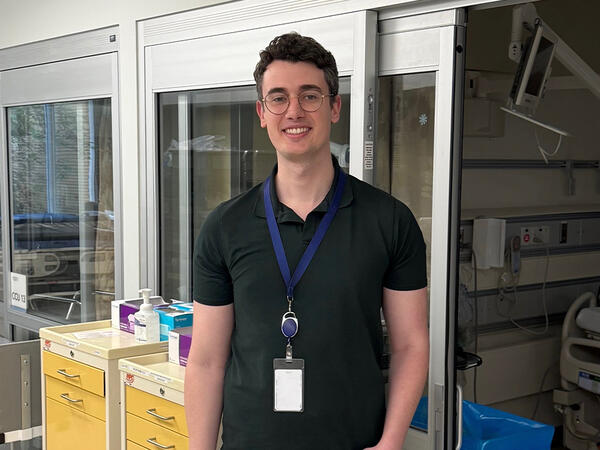From left to right: Dr. Sotiris Antoniou, Dr. John Papastergiou, Dr. Stephane Steurbaut, and Dr. Bart Van Den Bemt.
Over his career as a community pharmacist and assistant professor at the Leslie Dan Faculty of Pharmacy, John Papastergiou led impactful research examining pharmacist-led interventions. Along with his pharmacy team and academic colleagues, he published papers on services such as immunizations and medication reviews, and their impact on pharmacists and patients.
That research, which started as small projects taking place at his three downtown Toronto pharmacies, eventually culminated in Papastergiou earning a PhD from Radboud University in the Netherlands, which he successfully defended this spring.
“We wanted to look at practices that would add value for pharmacists and patients.”
“First and foremost, I’m a frontline pharmacist and business person, so any of the work that we explored had to have the potential to become sustainable,” says Papastergiou. “We wanted to look at practices that would add value for pharmacists and patients but would also be practical enough that they wouldn’t be abandoned, and we could actually continue to offer.”
Papastergiou has been a recognized leader in the pharmacy profession for many years, with faculty appointments, consulting roles, regular media appearances and a number of leadership awards.
Adding a PhD to his list of accomplishments wasn’t initially part of his plan. But he says that as his research began to focus on a couple of central themes related to the scope of pharmacy practice, it began to make sense as a PhD thesis. Bart van den Bemt, a professor at Radboud University who was part of an international working group with Papastergiou, became his thesis supervisor and other research collaborators formed the rest of his advisory committee.
His projects centred on the use of point-of-care screening for conditions such as diabetes and chronic kidney disease in community pharmacies and how pharmacists could use pharmacogenomics—an approach to choosing the best medication for an individual based on their genetic profile—to improve patient care.
Clinical trial demonstrates value of community pharmacists using pharmacogenomics
A key part of Papastergiou’s thesis was a randomized controlled trial examining how pharmacists could use pharmacogenomics to help with tailoring medication for anxiety and depression based on a patient’s genetic profile. The study, which included more than 200 patients at his pharmacies, showed that patients who received pharmacogenomics-guided treatment improved more than patients who received standard care. Papastergiou says the study shows the value of pharmacogenomics and how pharmacists can include it in their pharmacies, and it was key evidence needed for insurers including Green Shield, which funded the study, to provide coverage for pharmacogenomics testing.
“We could show definitively in that trial that when pharmacists are armed with a genetic test, patients do better and improve quicker. It was very exciting to see that work,” says Papastergiou. “The overarching goal behind all this work was to show the value of pharmacists, that they can offer novel services within an existing workflow, and they can do it to improve overall patient care. We wanted to show that we could push pharmacists’ scope further and show the value of the work that we were already doing.”
“The overarching goal behind all this work was to show the value of pharmacists, that they can offer novel services within an existing workflow, and they can do it to improve overall patient care.”
While not every pharmacist needs to complete an advanced degree, Papastergiou says that clinical pharmacists who have rigorous research experience have an important role in changing pharmacy practice.
“We absolutely need academics and frontline staff, but for real change to happen, we have to have some people who understand what is needed to push the profession forward and can provide the evidence to support those changes,” says Papastergiou. “Pharmacists have been given an expanded scope, but stakeholders are asking for evidence about whether this is providing any value. We need more people who can understand both sides because that’s where we’ll get true practice change.”
Papastergiou’s research on pharmacists using point-of-care screening is already helping to change pharmacy practice in Canada and abroad.
“A lot of this early work started on a very small scale, but it has resulted in practice change and funding in Canada, and many community pharmacies across Canada are now providing this service. Now we’re seeing our collaborators in the U.K. start to roll it out based on our work, and hopefully we’ll see a global movement,” says Papastergiou. “This is the culmination of a lot of people working together with the common goal to move the profession forward, and I think we’re starting to see that impact.”
More News
Image

Welcoming Ivy Lam as Academic Lead in Climate, Health & Sustainable Care
Assistant Professor Lam will guide the Leslie Dan Faculty of Pharmacy's efforts to embed environmental sustainability across the Faculty.
Read More
Image

Pharmacy alum’s research shows how full-scope practice improves cancer care
Honoured with a national award, Adrian de Boer says his residency experience was a powerful reminder that he's making a meaningful change to the pharmacy profession.
Read More
Image

Pharmacy alum passionate about helping community pharmacists practice to full scope
As a pharmacy leader at Rexall, Heidi Wittke uses frontline experience to lead initiatives that improve patient care
Read More
